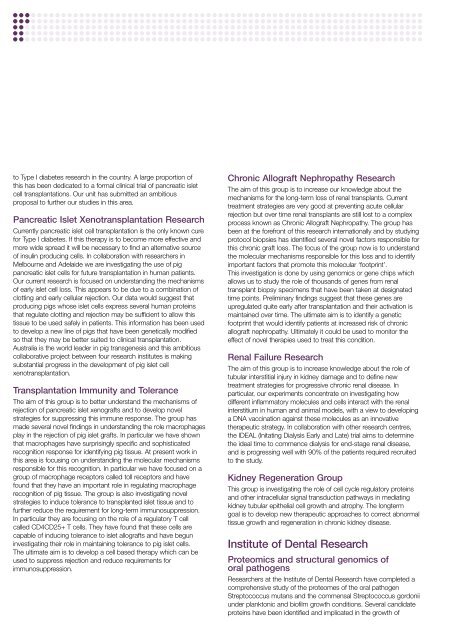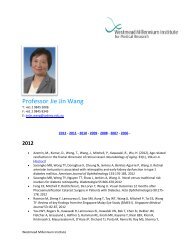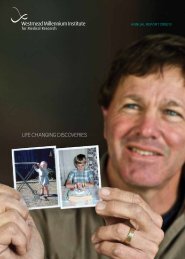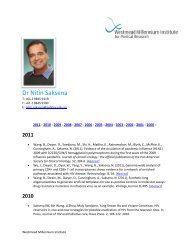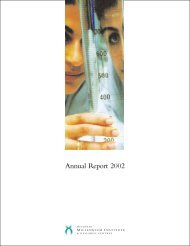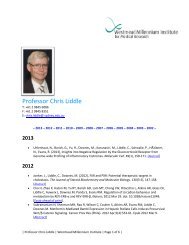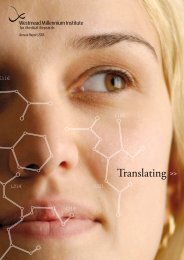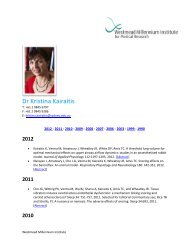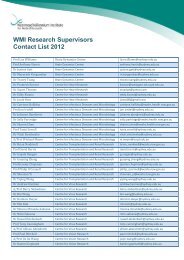Annual Report 2005 - Westmead Millennium Institute
Annual Report 2005 - Westmead Millennium Institute
Annual Report 2005 - Westmead Millennium Institute
Create successful ePaper yourself
Turn your PDF publications into a flip-book with our unique Google optimized e-Paper software.
to Type I diabetes research in the country. A large proportion ofthis has been dedicated to a formal clinical trial of pancreatic isletcell transplantations. Our unit has submitted an ambitiousproposal to further our studies in this area.Pancreatic Islet Xenotransplantation ResearchCurrently pancreatic islet cell transplantation is the only known curefor Type I diabetes. If this therapy is to become more effective andmore wide spread it will be necessary to find an alternative sourceof insulin producing cells. In collaboration with researchers inMelbourne and Adelaide we are investigating the use of pigpancreatic islet cells for future transplantation in human patients.Our current research is focused on understanding the mechanismsof early islet cell loss. This appears to be due to a combination ofclotting and early cellular rejection. Our data would suggest thatproducing pigs whose islet cells express several human proteinsthat regulate clotting and rejection may be sufficient to allow thistissue to be used safely in patients. This information has been usedto develop a new line of pigs that have been genetically modifiedso that they may be better suited to clinical transplantation.Australia is the world leader in pig transgenesis and this ambitiouscollaborative project between four research institutes is makingsubstantial progress in the development of pig islet cellxenotransplantation.Transplantation Immunity and ToleranceThe aim of this group is to better understand the mechanisms ofrejection of pancreatic islet xenografts and to develop novelstrategies for suppressing this immune response. The group hasmade several novel findings in understanding the role macrophagesplay in the rejection of pig islet grafts. In particular we have shownthat macrophages have surprisingly specific and sophisticatedrecognition response for identifying pig tissue. At present work inthis area is focusing on understanding the molecular mechanismsresponsible for this recognition. In particular we have focused on agroup of macrophage receptors called toll receptors and havefound that they have an important role in regulating macrophagerecognition of pig tissue. The group is also investigating novelstrategies to induce tolerance to transplanted islet tissue and tofurther reduce the requirement for long-term immunosuppression.In particular they are focusing on the role of a regulatory T cellcalled CD4CD25+ T cells. They have found that these cells arecapable of inducing tolerance to islet allografts and have beguninvestigating their role in maintaining tolerance to pig islet cells.The ultimate aim is to develop a cell based therapy which can beused to suppress rejection and reduce requirements forimmunosuppression.Chronic Allograft Nephropathy ResearchThe aim of this group is to increase our knowledge about themechanisms for the long-term loss of renal transplants. Currenttreatment strategies are very good at preventing acute cellularrejection but over time renal transplants are still lost to a complexprocess known as Chronic Allograft Nephropathy. The group hasbeen at the forefront of this research internationally and by studyingprotocol biopsies has identified several novel factors responsible forthis chronic graft loss. The focus of the group now is to understandthe molecular mechanisms responsible for this loss and to identifyimportant factors that promote this molecular ‘footprint’.This investigation is done by using genomics or gene chips whichallows us to study the role of thousands of genes from renaltransplant biopsy specimens that have been taken at designatedtime points. Preliminary findings suggest that these genes areupregulated quite early after transplantation and their activation ismaintained over time. The ultimate aim is to identify a geneticfootprint that would identify patients at increased risk of chronicallograft nephropathy. Ultimately it could be used to monitor theeffect of novel therapies used to treat this condition.Renal Failure ResearchThe aim of this group is to increase knowledge about the role oftubular interstitial injury in kidney damage and to define newtreatment strategies for progressive chronic renal disease. Inparticular, our experiments concentrate on investigating howdifferent inflammatory molecules and cells interact with the renalinterstitium in human and animal models, with a view to developinga DNA vaccination against these molecules as an innovativetherapeutic strategy. In collaboration with other research centres,the IDEAL (Initating Dialysis Early and Late) trial aims to determinethe ideal time to commence dialysis for end-stage renal disease,and is progressing well with 90% of the patients required recruitedto the study.Kidney Regeneration GroupThis group is investigating the role of cell cycle regulatory proteinsand other intracellular signal transduction pathways in mediatingkidney tubular epithelial cell growth and atrophy. The longtermgoal is to develop new therapeutic approaches to correct abnormaltissue growth and regeneration in chronic kidney disease.<strong>Institute</strong> of Dental ResearchProteomics and structural genomics oforal pathogensResearchers at the <strong>Institute</strong> of Dental Research have completed acomprehensive study of the proteomes of the oral pathogenStreptococcus mutans and the commensal Streptococcus gordoniiunder planktonic and biofilm growth conditions. Several candidateproteins have been identified and implicated in the growth of


